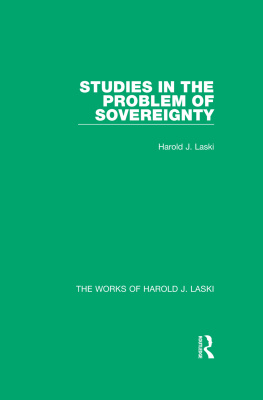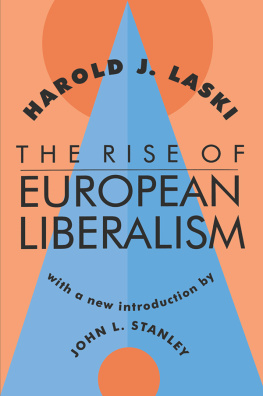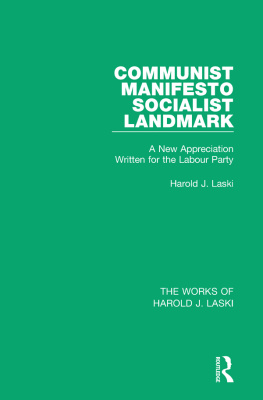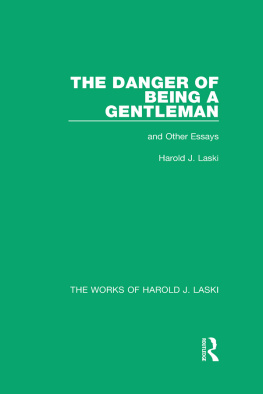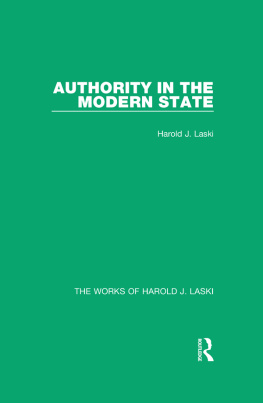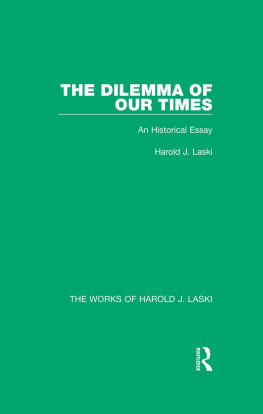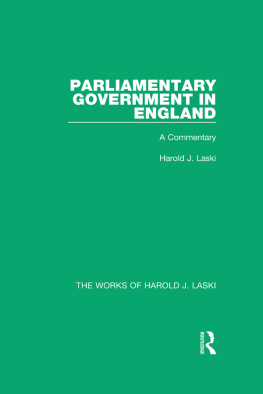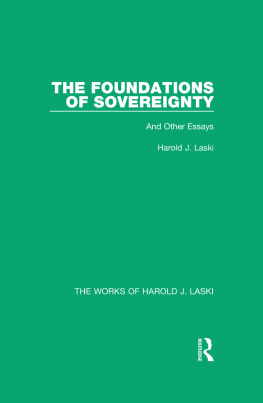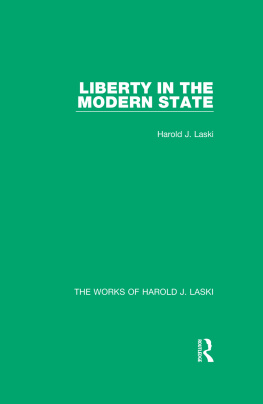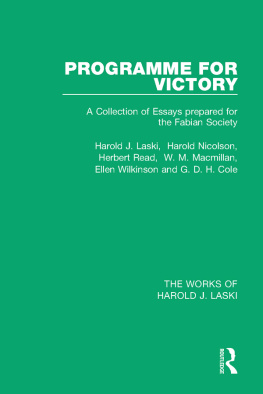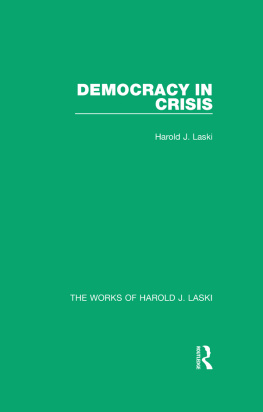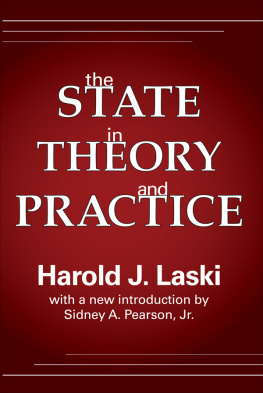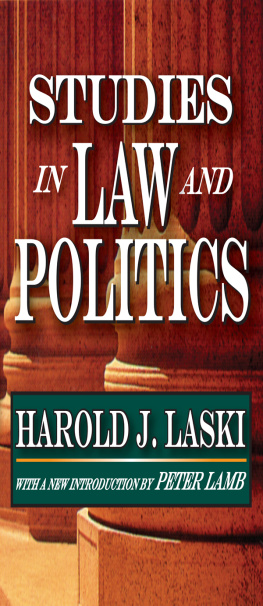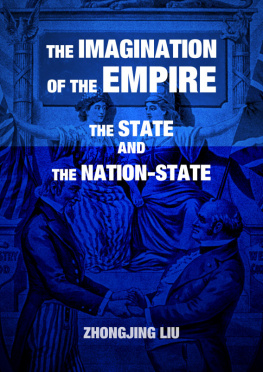THE WORKS OF HAROLD J. LASKI
Volume 1
STUDIES IN THE PROBLEM OF SOVEREIGNTY
STUDIES IN THE PROBLEM OF SOVEREIGNTY
HAROLD J. LASKI
First published in 1917
This edition first published in 2015
by Routledge
2 Park Square, Milton Park, Abingdon, Oxon, OX14 4RN
and by Routledge
711 Third Avenue, New York, NY 10017
Routledge is an imprint of the Taylor & Francis Group, an informa business
1917 Yale University Press
All rights reserved. No part of this book may be reprinted or reproduced or utilised in any form or by any electronic, mechanical, or other means, now known or hereafter invented, including photocopying and recording, or in any information storage or retrieval system, without permission in writing from the publishers.
Trademark notice: Product or corporate names may be trademarks or registered trademarks, and are used only for identification and explanation without intent to infringe.
British Library Cataloguing in Publication Data
A catalogue record for this book is available from the British Library
ISBN: 978-1-138-81912-2 (Set)
eISBN: 978-1-315-74273-1 (Set)
ISBN: 978-1-138-82178-1 (Volume 1)
eISBN: 978-1-315-74272-4 (Volume 1)
Publishers Note
The publisher has gone to great lengths to ensure the quality of this reprint but points out that some imperfections in the original copies may be apparent.
Disclaimer
The publisher has made every effort to trace copyright holders and would welcome correspondence from those they have been unable to trace.
STUDIES IN THE PROBLEM OF SOVEREIGNTY
BY
HAROLD J. LASKI
Of the Department of History in Harvard University
Sometime Exhibitioner of New College, Oxford
COPYRIGHT, 1917, BY
YALE UNIVERSITY PRESS
First published, March, 1917
Second printing, May, 1918
Your business as thinkers is to make plainer the way from something to the whole of things; to show the rational connection between your fact and the frame of the universe.
Speeches of Mr. Justice Holmes.
TO
H. A. L. FISHER AND ERNEST BARKER
FELLOWS OF NEW COLLEGE
WITH AFFECTIONATE GRATITUDE
This volume is the first of a series of studies in which I hope to discuss in various aspects the theory of the State. Its starting point is the belief that in such a theory, the problem of sovereignty is fundamental, and that only in the light of its conception can any satisfactory attitude be adopted. It is essentially a critical work, and it is only in the most tentative fashion that I have hinted at what seems to me the right avenue of approach. When I have finished similar studies in the political theory of the Catholic Reaction in France during the nineteenth century, and of the Conciliar Movement in the fifteenth, it may be that I shall be able to attempt a more constructive discussion. But it has not seemed to me entirely purposeless to point out the dangers of an attitude fraught with consequences so momentous to the character of our political institutions.
How much it owes to Maitland and Saleilles and Dr. Figgis, I dare not estimate; but if it sends anyone to their books (and particularly to Maitlands) I shall be well content. I owe much, too, to the work of my friend and colleague, Professor McIlwain, from whose High Court of Parliament I have derived a whole fund of valuable ideas. Nor have I, as I hope, failed to learn the lesson to be learned from the constitutional opinions with which Mr. Justice Holmes has enriched this generation. I would add that it was from Mr. Fisher that I first learned to understand the value of individuality, as it was from Mr. Barker that I first learned the meaning of community.
I should like, too, to associate whatever there is of good in the thought of this book, with the name of my friend, Alec Rowan Herron, Scholar of New College and second-lieutenant in the Kings Royal Rifles, who fell at Givenchy in the first year of war. What we have lost in him only those of us who had the rare privilege of his intimate friendship can tell; but I may be permitted to say that it was the opinion of those with the right to judge that a very brilliant career lay before him.
This book could never have been written were it not for the constant and splendid sympathy of my friend, Professor Frankfurter of the Harvard Law School. If I mention that, and the debt it of course owes to my wife, it is not in repayment, but in recognition. They, I know, will understand.
I have to thank the editors of the American Political Science Review, the Canadian Law Times, the New Republic, and the Journal of Philosophy, Psychology and Scientific Methods for leave to use material already printed in their pages.
H. J. L.
September 28, 1916.
Harvard University.
CONTENTS
H EGELIANWISE, we can not avoid the temptation that bids us make our State a unity. It is to be all-absorptive. All groups within itself are to be but the ministrants to its life; their reality is the outcome of its sovereignty, since without it they could have no existence. Their goodness is gained only through the overshadowing power of its presence. It alone, so to speak, eternally is; while they exist but to the extent to which its being implies them. The All, America, includes, implicates in James phrase, its constituent states. They are one with it and of itone and indivisible. Each has its assigned place and function in the great Whole which gives them life. This is essential; for otherwise we should have what Mr. Bradley calls a plurality of reals; which is to destroy the predicated unity.
Of the exaltation of such unity a long history could be written. To speak only of medieval times, it would have to tell of Dante with his maxime unum as the maxime bonum; nor dare we repaint the picture he drew of that world state which is one because its law is one and its spirit also. State must be, Gregory VII will tell us, absorbed in Church; and so the eighth Boniface, perhaps with some lingering thought of Aquinas in his mind, will declare the heresy of dualism and straightway make claim to the lordship of the world. Binarius numerus infamisso it was Aquinas wrote; and so it is that your pope must have the plenitudo potestatis and your emperor be legibus solutus. Thus will they embody all and transcend the shifting variety of an inconvenient multiplicity.
Your medieval thinker deals in worlds; with the Renaissance is born the national State. But only the perspective is altered. Still the problem is this monistic reduction. How to make of many one was surely the problem Henry VIII confronted when he declared the realm of England to be an empire; for if it is capable of such promotion then is its king imperial, and he may work his will with recalcitrant chancellors who look vainly Romewards. So, too, with the Stuart. He mistakes the popular basis of the Tudor throne, and thinks a sovereignty in practice theoretical also. It is his, he urges, by a right divine. Like another Richard II he feels that the laws are in his own breast; while non-juring Hickes will preach solemnly of the Stuart rectitude as he lays down the gospel of non-resistance.
It seems far off; yet in truth it is very near to us. It would be no inapt definition of politics in our time to term it the search for social unity. Whatever political problems we may consider upon this fundamental question, we shall always ultimately be driven back. How far, and in what way, is our society one? How far is there an interest of the Whole, a monistic interest, which transcends the interests of the Many who compose that whole? It is a fundamental question; thereforeas the Parmenides bears witnessit is amazingly subtle and difficult. We shall find, I think, that there is one best method of considering our problem. Suppose that on the one hand we adopt the monist solution, what concrete difference will that make to our political life? If we are pluralists, how does that affect our activities? What, in short, are the consequences of our attitude? It is from them we may deduce its truth.

